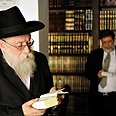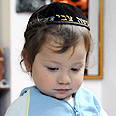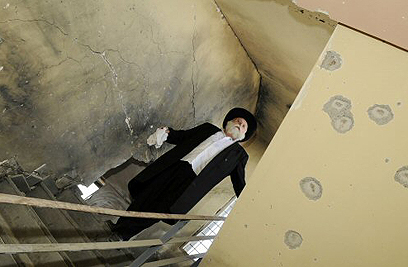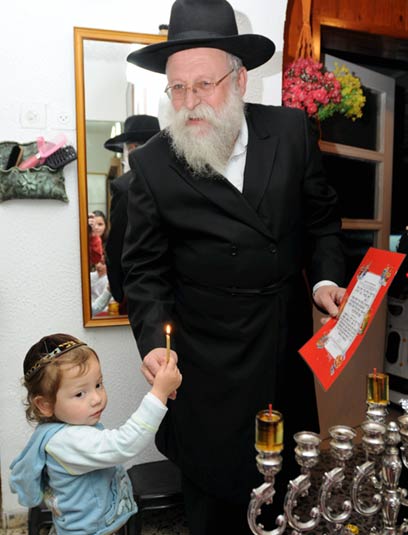


Going through the Trials of Job
After losing daughter and son-in-law in Mumbai Chabad House attack, Rabbi Shimon Rosenberg finds comfort in grandson Moishi. But now, family faces another tragedy as six-year-old grandson Haim suffers from very serious burn wounds. 'Faith makes it easier to handle, but it's difficult with every blow'
Rabbi Shimon Rosenberg is a smiley man, even when he is full of grief. He talks about strength, powerful faith, and of the spiritual trials he will always overcome. A year-and-a-half ago he lost his daughter, Rivka Holtzberg, who - together with her husband Gavriel - was killed in an attack on the Chabad House in Mumbai. Since then, the rabbi and his wife Yehudit have been raising their three-year-old grandson Moishi, who survived the attack thanks to Sandra, his Indian nanny. "He's like my 11th child," Rosenberg says, his face aglow.
But now, the Rosenbergs are fighting for the life of another one of their grandchildren, Haim Eliezer Lipman Gelfrin, nicknamed "Lazar", who was badly injured in a fire that broke out in his house last month. The six-year-old was rescued from the flames with very high degree burns. He has been under anesthesia and on life support for a month now, and has undergone three complicated operations, lost his left leg from the knee down, his right foot and the fingers from his left hand.
The boy was initially hospitalized at Haim Sheba Medical Center at Tel Hashomer, but on the advice of his doctors and with the help of head of the hospital's burns unit Dr. Josef Haik, he is now being treated at Shriners Hospital for Children in Cincinnati, Ohio, where there is a larger quantity of cultured skin substitutes than in Israel. This is particularly important in Haim's case, due to the severity of his burns and his young age, which means he is constantly growing and in need of additional transplants. His rehabilitation is expected to take a number of years.

Rabbi Rosenberg visiting Chabad House in Mumbai (Photo: AFP)
"It feels like the Trials of Job," Rosenberg admits softly. "This is a story that I identify with every day. A man keeps getting hit as some kind of test, and despite it all does not lose faith. They say I am strong. It is very easy to say we are strong, to say, 'be strong' – but it is very difficult to do. On a spiritual level, I believe that if a person has strong faith and has troubles befall him, particularly if this person comes from a family that has been through many such trials, it is easier for this person to handle because he is immune. But anyone who says it's not hard is lying. It's difficult with every blow and it hurts, and yes, we also cry. But this is our faith."
'Mom, get me out of the fire'
The parents and children of the Rosenberg family, who are still hurting over the death of their daughter Rivka in the Mumbai attack, are supporting each other in the new crisis as well. The media exposure is hard on them. This is the first time Rosenberg speaks about his injured grandson. I am sitting with him and his daughter Dvori Gelfrin, Haim's mother. One of the sisters joins us. Another brother phoned this morning to speak with them.
They all look after one another, finish each other's sentences. They do everything to keep the family together and strong. When the subject of India is brought up, the sisters are overwhelmed with the experience the tragedy brought. "In India, father supported us with faith and words of the Torah. Now, I am supporting him," says Dvori. "The one that brought the terrorists to the house is the same one that brought the fire to us. All this actually gave me a life lesson in faith. India strengthened my faith, and now it has been strengthened a hundredfold due to the trials we are going through."
She remembers every moment from the serious fire. How the children woke her up screaming, "Lazar is on fire, save him," how angry she was at herself for not waking up on her own, how she ran to save her small child. "I saw the light of the flames from the hallway," she says. "I saw three huge fires in the room, half of the bed was consumed. The room had become a trap. I saw Lazar jump on the bed and say, 'Mom, get me out of the fire, my eyes are burning.' I didn't know what to do from the stress, I wanted to go in, but I knew I would burn along with him, so I opened the door and started to shout for help. Following the neighbor's efforts they managed to put the fire out."
She relives these moments every single day. She remembers in detail how her son was taken out of the room, still dressed, still with his Tzitzit (the tassels attached to his garment), and still breathing on his own. "It seemed that the fire didn't touch him, and all the burns were actually from the heat," she explains. "I begged them to keep him alive. In the hospital, I stroked his legs; I felt the difference between a living limb and a dead one. It was like a lump that did not function and did not move."
On top of Dvori's concern was the fear of telling her parents that another tragedy had occurred. "I thought, how do I just tell them what happened? Over the phone? I waited till morning, I let my siblings handle it," she says.
"The day after the fire, at 6:15 am, after prayer, my son who lives in Kfar Tavor, suddenly came over and suggested having some coffee," Rosenberg recounts. "We sat in the garden and he told me there was a fire at Dvori's and that everyone was alright, but that Lazar was burned. I told him that we are all adults, and he should just tell us exactly what happened, and he replied telling me to take tefillin so we can go."

Moishi lighting Hanukkah candle with grandfather (Archives: Doron Golan)
During the drive, the grandfather made some phone calls to find out what happened. "And then it hit me. The second you understand what happened it takes you back to what happened a year-and-a-half ago. Back to the loss, back to the sense of abandonment, to having to deal with certain difficult sights," he says. "When I saw Lazar burnt and bandaged with all those machines, it was a very difficult sight. You don't know where to look first, at which tube. You don't know what's going on with your grandchild."
Towards the end of that day, Rosenberg says, he went to Dvori's house in Kiryat Malachi, but refused to go up to the apartment. "They told me to go up and see what was left after the fire, but I refused," he admits. "I saw the child in a life-threatening state, and luckily, he came out alive. But I did not want to keep images of the burnt apartment in my head. When I went to India, I actually wanted to see the pictures over and over again. I wanted to see where Rivki and Gabi, of blessed memory, would eat, drink, sleep. To know and feel what the attack really was – where they were found, where they were laying. I couldn't detach. I also went there to mark the 30 day memorial since their death, and I went for the one-year memorial."
Only after the incident, Dvori interrupts her father to say, did she come to understand a fraction of what her parents must have felt after the Mumbai attack. "A parent's suffering cannot be explained," she says. "They did not let me go up to the apartment after the fire, and I am thankful for that on the one hand, but also angry on the other hand. Whoever saw the house could not believe that anyone would come out alive. Now I understand father, how much he suffered when he went to see what happened to Rivki, but he still wanted to be there, to know what his daughter went through. This is also what I wanted, to see again exactly what my son had been through."
They draw strength from their faith and from scripture. There is a lesson to be learned from every occurrence. What they are going through now is also a lesson in faith. "Lazar flew on Monday, and on Wednesday they told me that they had to amputate some limbs," Rabbi Rosenberg says. "It was early in the morning. Shmulik, his father had to make the difficult decision and I thought about how to deal with it and how to tell Dvori. To this day I have in my pocket the answer I got from the writings of the rabbi (Lubavitcher Rebbe Menachem Mendel Schneerson), which say that even when things lead to brokenness and grief, we must understand that God, the Holy One, blessed be He, is the ruler of the world, and there are ways to keep the faith. Obviously, this is hard work. A person must work on himself to believe that what he is doing is only for the best and that the Holy One gives and takes. I will not ask why these things happened, but will try to learn and grow stronger from them."
Smiling thanks to Moishi
It seems this family is holding on to whatever they can. Even after the Mumbai attack they united, and found strength and faith in each other. Today, Moishi, an active, smiley boy, reminds them more and more of his parents who they so loved, and brings a smile to their faces. Now, with Haim's father abroad with his son, the sisters are dividing the nights between themselves so that Dvori is not left sleeping alone with her children at the house in Kiryat Malachi.
Last week would have been Rivka's 30th birthday. Renovation was scheduled to begin at the shattered Chabad house, and Rosenberg had planned to return to Mumbai to see the place. "But I have to stay here and help Lazar and Dvori," he says.
The soft-spoken rabbi is convinced – and convinces anyone he talks to – that this boy will also survive the disaster. But a very long and difficult path lies ahead for Haim. Every week he undergoes another skin transplant, treatments that will take place for around five more months, after which, he will begin a long process of rehabilitation that may last between two and four years.
Now, Dvori is planning to move with her three other children to the United States for the rest of Haim's treatment, but the family's stay in the US and the expected treatment costs are estimated at some $500,000 per year. "The children keep asking me about him, they want to see his pictures after the fire, after the operation, they say they miss him," says the mother. "I would also like to be beside him, but I don't have the financial ability to be there for him."
"We thank all those who have prayed for us and supported us, and the doctors who are treating Lazar, and we ask for the public's support so that we can bring him home," Rosenberg concludes.
To make a donation, contact the Friends for Health organization at ++972-35777666 or visit the Haim Eliezer Gelfrin fund at www.haverim.org.il
- Follow Ynetnews on Facebook















